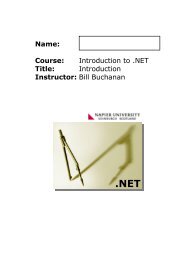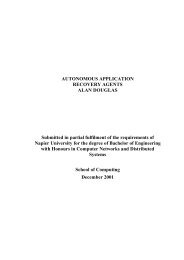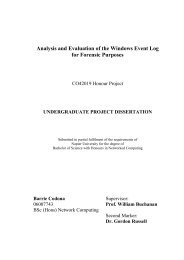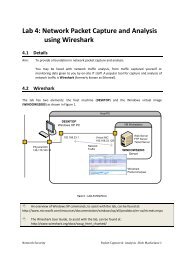- Page 2 and 3: AbstractThe biological immune syste
- Page 4 and 5: DeclarationI declare that this thes
- Page 6: Table of Contents1 Introduction 11.
- Page 9 and 10: 5.3.1 Default Parameters . . . . .
- Page 11: List of Figures2.1 ’Lock and Key
- Page 14 and 15: List of Tables2.1 Structural and fu
- Page 16 and 17: Chapter 1IntroductionThe study of b
- Page 18 and 19: Chapter 1. Introduction 3scientists
- Page 20 and 21: Chapter 1. Introduction 5Thus, the
- Page 22 and 23: Chapter 1. Introduction 7of the cha
- Page 26 and 27: Chapter 2. Background 11paratopeepi
- Page 28 and 29: Chapter 2. Background 13antigenepit
- Page 30 and 31: £Chapter 2. Background 15low the m
- Page 32 and 33: Chapter 2. Background 17Antigene 0p
- Page 34 and 35: Chapter 2. Background 19maintained
- Page 36 and 37: E £ ρ¥ £Chapter 2. Background 2
- Page 38 and 39: Chapter 2. Background 23genetically
- Page 40 and 41: Chapter 2. Background 251. Choose a
- Page 42 and 43: Chapter 2. Background 27non-interbr
- Page 44 and 45: Chapter 2. Background 29been made i
- Page 46 and 47: Chapter 2. Background 31patterns wi
- Page 48 and 49: Chapter 2. Background 33reported on
- Page 50 and 51: Chapter 2. Background 35Immunos 81
- Page 52 and 53: Chapter 2. Background 37recognition
- Page 54 and 55: Chapter 2. Background 391. Create a
- Page 56 and 57: Chapter 2. Background 41environment
- Page 58 and 59: Chapter 2. Background 43a)input dat
- Page 60 and 61: Chapter 2. Background 45antibody wi
- Page 62 and 63: Chapter 3. Immune Systems for Sched
- Page 64 and 65: Chapter 3. Immune Systems for Sched
- Page 66 and 67: Chapter 3. Immune Systems for Sched
- Page 68 and 69: Chapter 3. Immune Systems for Sched
- Page 70 and 71: Chapter 3. Immune Systems for Sched
- Page 72 and 73: Chapter 3. Immune Systems for Sched
- Page 74 and 75:
Chapter 3. Immune Systems for Sched
- Page 76 and 77:
Chapter 3. Immune Systems for Sched
- Page 78 and 79:
Chapter 3. Immune Systems for Sched
- Page 80 and 81:
Chapter 3. Immune Systems for Sched
- Page 82 and 83:
Chapter 3. Immune Systems for Sched
- Page 84 and 85:
££Chapter 3. Immune Systems for S
- Page 86 and 87:
Chapter 3. Immune Systems for Sched
- Page 88 and 89:
Chapter 3. Immune Systems for Sched
- Page 90 and 91:
Chapter 3. Immune Systems for Sched
- Page 92 and 93:
Chapter 3. Immune Systems for Sched
- Page 94 and 95:
Chapter 3. Immune Systems for Sched
- Page 96 and 97:
Chapter 3. Immune Systems for Sched
- Page 98 and 99:
Chapter 3. Immune Systems for Sched
- Page 100 and 101:
Chapter 3. Immune Systems for Sched
- Page 102 and 103:
Chapter 3. Immune Systems for Sched
- Page 104 and 105:
Chapter 3. Immune Systems for Sched
- Page 106 and 107:
Chapter 3. Immune Systems for Sched
- Page 108 and 109:
Chapter 3. Immune Systems for Sched
- Page 110 and 111:
Chapter 3. Immune Systems for Sched
- Page 112 and 113:
Chapter 3. Immune Systems for Sched
- Page 114 and 115:
Chapter 3. Immune Systems for Sched
- Page 116 and 117:
Chapter 3. Immune Systems for Sched
- Page 118 and 119:
Chapter 4Applying an Immune System
- Page 120 and 121:
Chapter 4. Applying an Immune Syste
- Page 122 and 123:
Chapter 4. Applying an Immune Syste
- Page 124 and 125:
Chapter 4. Applying an Immune Syste
- Page 126 and 127:
Chapter 4. Applying an Immune Syste
- Page 128 and 129:
Chapter 4. Applying an Immune Syste
- Page 130 and 131:
Chapter 5. EA Based Model — COSDM
- Page 132 and 133:
Chapter 5. EA Based Model — COSDM
- Page 134 and 135:
Chapter 5. EA Based Model — COSDM
- Page 136 and 137:
JH £ c i ¤ a¥ :Chapter 5. EA Bas
- Page 138 and 139:
Chapter 5. EA Based Model — COSDM
- Page 140 and 141:
Chapter 5. EA Based Model — COSDM
- Page 142 and 143:
Chapter 5. EA Based Model — COSDM
- Page 144 and 145:
Chapter 5. EA Based Model — COSDM
- Page 146 and 147:
Chapter 5. EA Based Model — COSDM
- Page 148 and 149:
Chapter 5. EA Based Model — COSDM
- Page 150 and 151:
Chapter 5. EA Based Model — COSDM
- Page 152 and 153:
Chapter 5. EA Based Model — COSDM
- Page 154 and 155:
Chapter 5. EA Based Model — COSDM
- Page 156 and 157:
Chapter 6. A Self-Organising SDM
- Page 158 and 159:
Chapter 6. A Self-Organising SDM
- Page 160 and 161:
Chapter 6. A Self-Organising SDM
- Page 162 and 163:
Chapter 6. A Self-Organising SDM
- Page 164 and 165:
Chapter 6. A Self-Organising SDM
- Page 166 and 167:
J:¡Chapter 6. A Self-Organising SD
- Page 168 and 169:
¡¡¡Chapter 6. A Self-Organising
- Page 170 and 171:
Chapter 6. A Self-Organising SDM
- Page 172 and 173:
Chapter 6. A Self-Organising SDM
- Page 174 and 175:
Chapter 6. A Self-Organising SDM
- Page 176 and 177:
£Chapter 6. A Self-Organising SDM
- Page 178 and 179:
g£££1 At iteration 0 of the algo
- Page 180 and 181:
Chapter 6. A Self-Organising SDM
- Page 182 and 183:
Chapter 6. A Self-Organising SDM
- Page 184 and 185:
Chapter 6. A Self-Organising SDM
- Page 186 and 187:
Chapter 6. A Self-Organising SDM
- Page 188 and 189:
Chapter 6. A Self-Organising SDM
- Page 190 and 191:
Chapter 6. A Self-Organising SDM
- Page 192 and 193:
Chapter 6. A Self-Organising SDM
- Page 194 and 195:
Chapter 7Conclusion7.1 OverviewThis
- Page 196 and 197:
Chapter 7. Conclusion 181however wh
- Page 198 and 199:
Chapter 7. Conclusion 183features m
- Page 200 and 201:
Chapter 7. Conclusion 185In additio
- Page 202 and 203:
Chapter 7. Conclusion 187ter, sched
- Page 204 and 205:
Chapter 7. Conclusion 189Clustering
- Page 206 and 207:
Chapter 7. Conclusion 191nature in
- Page 208 and 209:
Appendix ACoincidences in permutati
- Page 210 and 211:
Appendix BExperimental results obta
- Page 212 and 213:
Appendix B. Experimental results ob
- Page 214 and 215:
Appendix B. Experimental results ob
- Page 216 and 217:
Appendix B. Experimental results ob
- Page 218 and 219:
Bibliography 203[Cooke and Hunt, 19
- Page 220 and 221:
Bibliography 205[Farmer et al., 198
- Page 222 and 223:
Bibliography 207[Hart et al., 1998]
- Page 224 and 225:
Bibliography 209[Kohonen, 1982b] Ko
- Page 226 and 227:
Bibliography 211[Potter and De Jong
- Page 228:
Bibliography 213[Timmis et al., 199


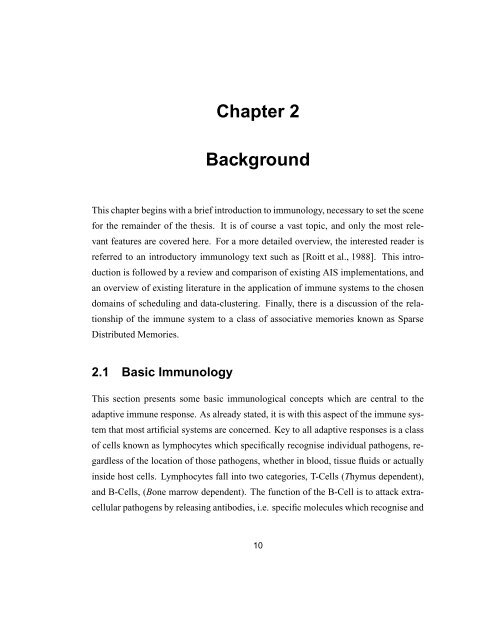
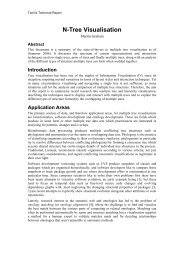
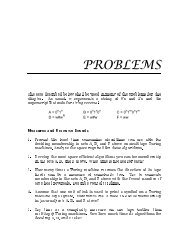
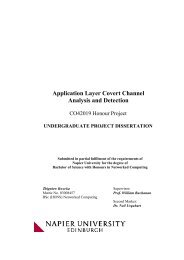


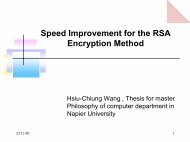
![Unit 5. Switches and VLANs [PDF]](https://img.yumpu.com/34422504/1/184x260/unit-5-switches-and-vlans-pdf.jpg?quality=85)
